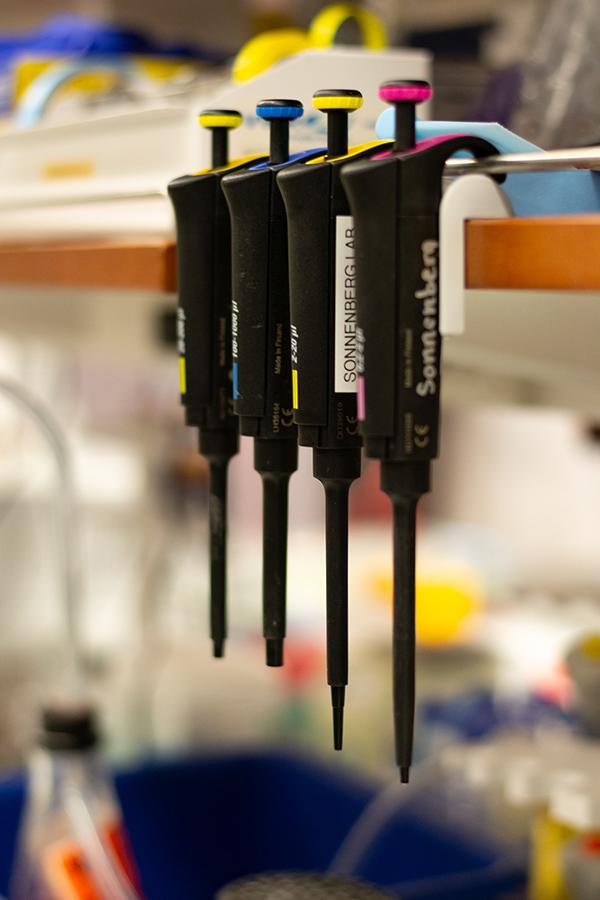The immune system has numerous functions that are essential for human health, such as protection from infection or malignancy, regulation of metabolic homeostasis, and promotion of tissue repair. However, inappropriate immune responses drive chronic inflammatory disorders, such as inflammatory bowel disease, autoimmunity, neurodegeneration, allergies, or various cancers. Therefore, a greater understanding of the immune system will fundamentally advance biomedical research and drive the development of novel preventative, therapeutic and curative treatment strategies for human diseases. The only way to accomplish this is to fully define the complex cellular and molecular networks by which the immune system functionally interacts with itself, other mammalian cell types and beneficial or pathogenic microbes. This is the long-term research goal of the Sonnenberg Laboratory, with a focus on driving highly novel advances, innovative expertise, and paradigm-shifting research that requires out-of-the-box ideas and fresh perspectives.
The Sonnenberg Lab studies the pathways that regulate a state of health in the gastrointestinal tract. This is a considerable challenge as this organ has an enormous surface area that is continuously exposed to dietary antigens, trillions of normally beneficial microbes (termed the microbiota), and frequent pathogens. Therefore, the mucosal immune system must be tolerant to innocuous stimuli, while protecting from infections. This functional dichotomy is likely why the intestine contains the largest and most sophisticated compartment of the immune system with numerous organized lymphoid structures and complex cellular networks. The Sonnenberg Laboratory has been at the forefront of research in this area, with a focus on emerging families of lymphocytes, antigen presenting cells (APCs), and consortia of microbes. Our seminal contributions include: (i) in 2013 we discovered RORgt+ APCs in the intestine and draining lymph node of both mice and humans, as well as defined their essential role in immune tolerance; (ii) over the next decade, we expanded our understanding of a diverse RORgt+ APC family, defined how they are regulated and sense the environment, and identified key roles for RORgt+ APCs in allergy, autoimmunity, cancer, and associated immunotherapies, as well as demonstrated that it is possible to experimentally manipulate RORgt+ APCs for therapeutic benefit; (iii) we established a paradigm that group 3 innate lymphoid cells (ILC3s) are genuine determinants of gut health and tissue physiology that are dysregulated in chronic diseases; and (iv) we identified novel checkpoints in the biology of cytokines, lymphocytes, APCs, and microbes that shape gut health and provide novel therapeutic opportunities.
We also developed a pioneering translational research effort involving clinical collaborators at Weill Cornell Medicine and other research institutions to examine primary human samples from both healthy individuals and defined patient populations, called the Jill Roberts Institute Live Cell Biobank. Our ongoing research will further interrogate mucosal immune responses and interactions with microbiota in healthy and diseased primary human tissue samples. We anticipate that these studies will allow us to directly translate our findings in mouse models to clinically relevant information.
Research from the Sonnenberg Laboratory has thus far has resulted in the publication of numerous primary articles in top-tier journals, including primary papers appearing in Nature, Science, Cell, Nature Medicine, Nature Immunology, Immunity, Science Immunology, Mucosal Immunology, and Cell Reports. Dr. Sonnenberg has published over 75 peer-reviewed primary and review papers and is continuously well funded by the NIH and private foundations. He is also recipient of numerous awards, including the Searle Scholar Award, the Burroughs Wellcome Fund Investigator in the Pathogenesis of Infectious Disease Award, the Society for Mucosal Immunology Young Investigator Award (inaugural year), the Cancer Research Institute Lloyd J. Old STAR Award (inaugural year), the International Cytokine & Interferon Society (ICIS)-Luminex John R. Kettman Award for Excellence in Interferon & Cytokine Research (inaugural year),the Forbes List of rising stars transforming Science and Healthcare, the AAI-BD Biosciences Investigator Award, and a NIH/NIAID MERIT Award (R37). Dr. Sonnenberg regularly serves on numerous peer review panels, including standing membership on panels for the NIH CSR Review and the Crohn’s and Colitis Foundation.
Talented graduate students and postdoctoral researchers are encouraged to directly contact Dr. Sonnenberg to discuss potential rotation projects and open positions in the laboratory.
Selected Publications
Zhou W, Zhou JZ, Ahmed A, Kim MJ; JRI Live Cell Bank; Guo CJ, Sonnenberg GF. ILC3s sense gut microbiota through STING to initiate immune tolerance. Immunity. 2025 Jul 8;58(7):1762-1777.e7. doi: 10.1016/j.immuni.2025.05.016. Epub 2025 Jun 16. PMID: 40527323; PMCID: PMC12240710.
Ahmed A, Joseph AM, Zhou J, Horn V, Uddin J, Lyu M, Joc J, JRI Live Cell Bank, Sockolow RE, Wing JB, Vivier E, Sakaguchi S, Sonnenberg GF. CTLA-4 expressing ILC3s restrain interleukin-23-mediated inflammation. Nature. 2024. https://doi.org/10.1038/s41586-024-07537-3
Joseph AM, Ahmed A, Goc J, Horn V, Fiedler B, Garone D, Grigg JB, Uddin J, Teng F, Fritsch M, Vivier E, Sonnenberg GF. RIPK3 and caspase-8 interpret cytokine signals to regulate ILC3 survival in the gut. Mucosal Immunology 2024 Aug 11:S1933-0219(24)00085-0. doi: 10.1016/j.mucimm.2024.08.004. Epub ahead of print. PMID: 39137882.
Horn V, Sonnenberg GF. Group 3 innate lymphoid cells in intestinal health and disease. Nature Reviews Gastroenterology & Hepatology 2024. https://doi.org/10.1038/s41575-024-00906-3
Abramson J, Dobeš J, Lyu M, Sonnenberg GF. The emerging family of RORγt+ antigen-presenting cells. Nature Reviews Immunology. 2023 Jul 21. doi: 10.1038/s41577-023-00906-5. Epub ahead of print. PMID: 37479834.
Lyu M, Suzuki H, Kang L, Gaspal F, Zhou W, Goc J, Zhou L, Zhou J, Zhang W, JRI Live Cell Bank, Shen Z, Fox JG, Sockolow RE, Laufer TM, Fan Y, Eberl G, Withers DR, Sonnenberg GF. ILC3s select microbiota-specific regulatory T cells to establish tolerance in the gut. Nature. 2022. https://doi.org/10.1038/s41586-022-05141-x
Zhou W, Zhou L, Zhou J; JRI Live Cell Bank, Chu C, Zhang C, Sockolow RE, Eberl G, Sonnenberg GF. ZBTB46 defines and regulates ILC3s that protect the intestine. Nature. 2022 Jul 13. doi: 10.1038/s41586-022-04934-4. Epub ahead of print. PMID: 35831503.
Zhou JZ, Sonnenberg GF. Coordination of Mucosal Immunity by Innate Lymphoid Cells. Adv Exp Med Biol. 2022;1365:113-134. doi: 10.1007/978-981-16-8387-9_8. PMID: 35567744.
Zhou L, Zhou W, Joseph AM, Chu C, Putzel GG, Fang B, Teng F, Lyu M, Yano H, Andreasson KI, Mekada E, Eberl G, Sonnenberg GF. Group 3 innate lymphoid cells produce the growth factor HB-EGF to protect the intestine from TNF-mediated inflammation. Nature Immunology. 2022 Jan 31. doi: 10.1038/s41590-021-01110-0. PMID: 35102343.
Grigg JB, Shanmugavadiv A, Regen T, Parkhurt CN, Ahmed A, Joseph AM, Mazzucco M, Gronke K, Diegenbach A, Eberl G, Vartanian T, Waisman A, Sonnenberg GF. Antigen presenting innate lymphoid cells orchestrate neuroinflammation. Nature. 2021 Dec;600(7890):707-712. doi: 10.1038/s41586-021-04136-4. Epub 2021 Dec 1. PMID: 34853467; PMCID: PMC8702489.
Teng F, Tachó-Piñot R, Sung B, Farber DL, Worgall S, Hammad H, Lambrecht BN, Hepworth MR, Sonnenberg GF. ILC3s control airway inflammation by limiting T cell responses to allergens and microbes. Cell Reports 2021 Nov 23;37(8):110051. doi: 10.1016/j.celrep.2021.110051. PMID: 34818549.
Goc J, Lv M, Bessman NJ, Flamar A, Sahota S, Suzuki H, Teng F, Putzel GG, JRI Live Cell Bank, Eberl G, Withers DR, Arthur JC, Shah MA, Sonnenberg GF. Dysregulation of ILC3s unleashes progression and immunotherapy resistance in colon cancer. Cell. 2021. Sep 16;184(19):5015-5030.e16. doi: 10.1016/j.cell.2021.07.029. PubMed PMID: 34407392
Bessman N.J., Mathieu J.R.R., Renassia C., Zhou L., Fung T.C., Fernandez K.C., Austin C., Moeller J.B., Zumerle S., Louis S., Vaulont S., Ajami N.J., Sokol H., Putzel G.G., Arvedson T., Sockolow R.E., Lakhal-Littleon S., Cloonan S.M., Arora M., Peyssonnaux C., Sonnenberg G.F.. Dendritic cell-derived hepcidin sequesters iron from the microbiota to promote mucosal healing. Science. 2020 Apr 10;368(6487):186-189. doi: 10.1126/science.aau6481. PubMed PMID: 32273468
Teng F, Goc J, Zhou L, Chu C, Shah MA, Eberl G, Sonnenberg GF. A circadian clock is essential for homeostasis of group 3 innate lymphoid cells in the gut. Science Immunology. 2019 Oct 4;4(40). pii: eaax1215. doi: 10.1126/sciimmunol.aax1215. PubMed PMID: 31586011.
Sonnenberg GF, Hepworth MR. Functional interactions between innate lymphoid cells and adaptive immunity. Nature Reviews Immunology. 2019 Jul 26. doi: 10.1038/s41577-019-0194-8. Review.PubMed PMID: 31350531.
Zhou L, Chu C, Teng F, Bessman NJ, Goc J, Santosa EK, Putzel GG, Kabata H, Kelsen JR, Baldassano RN, Shah MA, Sockolow RE, Vivier E, Eberl G, Smith KA, Sonnenberg GF. Innate lymphoid cells support regulatory T cells in the intestine through interleukin-2. Nature. 2019 Apr;568(7752):405-409. doi: 10.1038/s41586-019-1082-x. Epub 2019 Apr 3. PubMed PMID: 30944470; PubMed Central PMCID: PMC6481643.
Joseph AM, Monticelli LA, Sonnenberg GF. Metabolic regulation of innate and adaptive lymphocyte effector responses. Immunological Reviews. 2018 Nov;286(1):137-147. doi: 10.1111/imr.12703. Review. PubMed PMID: 30294971; PubMed Central PMCID: PMC6195227.
Zhou L, Sonnenberg GF. Essential immunologic orchestrators of intestinal homeostasis. Science Immunology. 2018 Feb 9;3(20). pii: eaao1605. doi: 10.1126/sciimmunol.aao1605. Review. PubMed PMID: 29440266; PubMed Central PMCID: PMC6352895.
Grigg JB, Sonnenberg GF. Host-Microbiota Interactions Shape Local and Systemic Inflammatory Diseases. Journal of Immunology. 2017 Jan 15;198(2):564-571. doi: 10.4049/jimmunol.1601621. Review. PubMed PMID: 28069751; PubMed Central PMCID: PMC5228396.
Fung TC, Bessman NJ, Hepworth MR, Kumar N, Shibata N, Kobuley D, Wang K, Ziegler CGK, Goc J, Shima T, Umesaki Y, Sartor RB, Sullivan KV, Lawley TD, Kunisawa J, Kiyono H, Sonnenberg GF. Lymphoid-Tissue-Resident Commensal Bacteria Promote Members of the IL-10 Cytokine Family to Establish Mutualism. Immunity. 2016 Mar 15;44(3):634-646. doi: 10.1016/j.immuni.2016.02.019. PubMed PMID: 26982365; PubMed Central PMCID: PMC4845739.
Withers DR, Hepworth MR, Wang X, Mackley EC, Halford EE, Dutton EE, Marriott CL, Brucklacher-Waldert V, Veldhoen M, Kelsen J, Baldassano RN, Sonnenberg GF. Transient inhibition of ROR-γt therapeutically limits intestinal inflammation by reducing TH17 cells and preserving group 3 innate lymphoid cells. Nature Medicine. 2016 Mar;22(3):319-23. doi: 10.1038/nm.4046. Epub 2016 Feb 15. PubMed PMID: 26878233; PubMed Central PMCID: PMC4948756.
Goc J., Hepworth M.R., Sonnenberg G.F., (2015) Group 3 innate lymphoid cells: regulating host-commensal bacteria interactions in inflammation and cancer. International Immunology. 2016 Jan;28(1):43-52. doi: 10.1093/intimm/dxv056. Epub 2015 Oct 7. Review. PubMed PMID: 26451009; PubMed Central PMCID: PMC5891988.
Kelsen JR, Baldassano RN, Artis D, Sonnenberg GF. Maintaining intestinal health: the genetics and immunology of very early onset inflammatory bowel disease. Cellular Molecular Gastroenterology Hepatology. 2015 Sep 1;1(5):462-476. PubMed PMID: 26393237; PubMed Central PMCID: PMC4574301.
Sonnenberg G.F., Artis D. (2015) Innate lymphoid cells in the initiation, regulation and resolution of inflammation Nature Medicine. 2015 Jul;21(7):698-708. doi: 10.1038/nm.3892. Epub 2015 Jun 29. Review. PubMed PMID: 26121198; PubMed Central PMCID: PMC4869856.
Hepworth MR, Fung TC, Masur SH, Kelsen JR, McConnell FM, Dubrot J, Withers DR, Hugues S, Farrar MA, Reith W, Eberl G, Baldassano RN, Laufer TM, Elson CO, Sonnenberg GF. Immune tolerance. Group 3 innate lymphoid cells mediate intestinal selection of commensal bacteria-specific CD4⁺ T cells. Science. 2015 May 29;348(6238):1031-5. doi: 10.1126/science.aaa4812. Epub 2015 Apr 23. PubMed PMID: 25908663; PubMed Central PMCID: PMC4449822.
Fung TC, Artis D, Sonnenberg GF. Anatomical localization of commensal bacteria in immune cell homeostasis and disease. Immunological Reviews. 2014 Jul;260(1):35-49. doi: 10.1111/imr.12186. Review. PubMed PMID: 24942680; PubMed Central PMCID: PMC4216679.
Sonnenberg GF. Regulation of intestinal health and disease by innate lymphoid cells. International Immunology. 2014 Sep;26(9):501-7. doi: 10.1093/intimm/dxu052. Epub 2014 May 12. PubMed PMID: 24821261; PubMed Central PMCID: PMC4142604.
Hepworth MR, Sonnenberg GF. Regulation of the adaptive immune system by innate lymphoid cells. Current Opinions in Immunology. 2014 Apr;27:75-82. doi: 10.1016/j.coi.2014.01.013. Epub 2014 Mar 3. Review. PubMed PMID: 24594491; PubMed Central PMCID: PMC3979357.
Hepworth MR, Monticelli LA, Fung TC, Ziegler CG, Grunberg S, Sinha R, Mantegazza AR, Ma HL, Crawford A, Angelosanto JM, Wherry EJ, Koni PA, Bushman FD, Elson CO, Eberl G, Artis D, Sonnenberg GF. Innate lymphoid cells regulate CD4+ T-cell responses to intestinal commensal bacteria. Nature. 2013 Jun 6;498(7452):113-7. doi: 10.1038/nature12240. Epub 2013 May 22. PubMed PMID: 23698371; PubMed Central PMCID: PMC3699860.
Sonnenberg GF, Artis D. Innate lymphoid cell interactions with microbiota: implications for intestinal health and disease. Immunity. 2012 Oct 19;37(4):601-10. doi: 10.1016/j.immuni.2012.10.003. Review. PubMed PMID: 23084357; PubMed Central PMCID: PMC3495160.
Sonnenberg GF, Monticelli LA, Alenghat T, Fung TC, Hutnick NA, Kunisawa J, Shibata N, Grunberg S, Sinha R, Zahm AM, Tardif MR, Sathaliyawala T, Kubota M, Farber DL, Collman RG, Shaked A, Fouser LA, Weiner DB, Tessier PA, Friedman JR, Kiyono H, Bushman FD, Chang KM, Artis D. Innate lymphoid cells promote anatomical containment of lymphoid-resident commensal bacteria. Science. 2012 Jun 8;336(6086):1321-5. doi: 10.1126/science.1222551. Epub 2012 Jun 6. PubMed PMID: 22674331; PubMed Central PMCID: PMC3659421.



